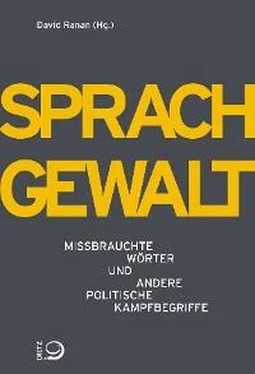Zwar befindet sich die Erforschung der Effekte des Fake News-Labels für die Medienwahrnehmung von BürgerInnen noch in den frühen Anfängen, sodass noch keine allgemeingültigen Aussagen über die Konsequenzen solcher Vorwürfe möglich sind. Nichtsdestotrotz sollte das potenzielle Risiko, dass das Fake News-Label ein wirksames Instrument zur Beeinflussung der Medienwahrnehmung (zumindest einiger) BürgerInnen sein könnte, Grund genug sein, die Verwendung des Begriffs zu überdenken – vor allem in Anbetracht dessen, dass er unabhängig vom Kontext, in dem er verwendet wird, keine intrinsische Bedeutung hat. Der Begriff Fake News ist nicht anwendbar, um alle Phänomene der Inkorrektheit in der Nachrichtenwelt zu erfassen. Stattdessen beschreibt er zwei sehr spezifische Fälle einer Krise in der Demokratie, die zunehmende Verbreitung von Desinformation einerseits (das Fake News-Genre ) und wachsende delegitimierende Medienkritik andererseits (das Fake News-Label ). Während ein völliger Verzicht auf den Begriff unrealistisch sein mag, sollte seine (weitere) Trivialisierung verhindert werden. Stattdessen sollte zu einer bewussteren Verwendung des Begriffs übergegangen werden, sowohl in der Wissenschaft als auch im Journalismus. Statt Fake News können aussagekräftigere Begriffe wie »Desinformation« oder einfach »falsche Nachrichten« verwendet werden. 46
J. Albright: Welcome to the era of fake news, in: Media and Communication (5), 2017, Nr. 2, S. 87–89.
T. Bale/S. van Kessel/P. Taggart: Thrown Around with Abandon? Popular Understandings of Populism as Conveyed by the Print Media: A UK Case Study, in : Acta Politica (46), 2011, Nr. 2, S. 111–131.
G. Baym: The Daily Show: Discursive integration and the reinvention of political journalism, in: Political Communication (22), 2005, Nr. 3, S. 259-276.
J. Brummette/M. DiStaso/M. Vafeiadis/M. Messner: Read All About It: The Politicization of »Fake News« on Twitter, in: Journalism & Mass Communication Quarterly (95), 2018, Nr. 2, S. 497-517.
M. Carlson: Introduction: The Many Relationships of Journalism, in: M. Carlson/S. C. Lewis (Hg.), Boundaries of journalism: Professionalism, practices and participation, London 2015, S. 1-26.
M. Carlson: Journalistic authority: Legitimating news in the digital era, New York 2017, S. 8.
M. Carlson: Fake News as an Informational Moral Panic: The Symbolic Deviancy of Social Media During the 2016 US Presidential Election, in: Information, Communication & Society (19), 2018, Nr. 13, S. 1879-1888.
D. Cheruiyot: Popular criticism that matters: Journalists’ perspectives of »quality« media critique, in: Journalism Practice (12), 2018, Nr. 8, S. 1008-1018.
J. L. Egelhofer/ S. Lecheler: Fake news as a two-dimensional phenomenon: a framework and research agenda, in: Annals of the International Communication Association (43), 2019, Nr. 2, S. 97-116
J. L. Egelhofer/ L. Aaldering/J. M. Eberl/S. Galyga/S. Lecheler: From Novelty to Normalization? How Journalists Use the Term »Fake News« in their Reporting, in: Journalism Studies (21), 2020, Nr. 10, S. 1-21.
F. Esser/A. Stępińska/D. Hopmann: Populism and the media. Cross-national findings and perspectives, in: T. Aalberg/F. Esser/C. Reinemann/J. Stromback/C. De Vreese (Hg.), Populist political communication in Europe, New York 2016, S. 365-380.
J. Farkas/J. Schou: Fake News as a Floating Signifier: Hegemony, Antagonism and the Politics of Falsehood, in: Javnost – The Public (25), 2018, Nr. 3, S. 298-314.
Nayla Fawzi: Right-Wing Populist Media Criticism, in: Benjamin Krämer/Christina Holtz-Bacha (Hg.), Perspectives on Populism and the Media, 2020, S. 39-56.
A. Guess/B. Nyhan/J. Reifler: »You’re Fake News!« The 2017 Poynter Media Trust Survey, ‹ https://poyntercdn.blob.core.windows.net/files/PoynterMediaTrustSurvey2017.pdf›.
J. Habgood-Coote: Stop Talking About Fake News!, in: Inquiry 62 (9-10), 2019, S. 1033-1065.
HLEG: A multi-dimensional approach to disinformation. Report of the independent High level Group on fake news and online disinformation, 2018, ‹ https://ec.europa.eu/digital-single-market/en/news/final-report-high-level-expert-group-fake-news-and-online-disinformation›.
I. Khaldarova/M. Pantti: Fake news, in: Journalism Practice (10), 2016, Nr. 7, S. 891-901.
J. M. Ladd: Why Americans hate the news media and how it matters, Princeton 2012.
G. Lakoff: »How You Help Trump«, 2018, ‹ https://medium.com/@GeorgeLakoff/howyou-help-trump-9d0139b9d4c9›.
A. Mitchell/J. Gottfried/S. Fedeli/G. Stocking/M. Walker: Many Americans Say Made-Up News Is a Critical Problem That Needs To Be Fixed, Pew Research Center, 2019, ‹ https://www.journalism.org/2019/06/05/many-americans-say-made-upnews-is-a-critical-problem-that-needs-to-befixed/›.
R. K. Nielsen/L. Graves: »News you don’t believe«: Audience perspectives on fake news, Reuters Institute for the Study of Journalism, 2017, ‹ https://ora.ox.ac.uk/objects/uuid:6eff4d14-bc72-404d-b78a-4c2573459ab8›.
J. Posetti/A. Matthews: A short guide to the history of »fake news« and disinformation, in: International Center for Journalists (7), 2018.
F. Prochazka/P. Weber/W. Schweiger: Effects of civility and reasoning in user comments on perceived journalistic quality, in: Journalism studies (19), 2018, Nr. 1, S. 62-78.
C. Reinemann/T. Aalberg/F. Esser/J. Strömbäck/C. H. de Vreese: Populist Political Communication, in: T. Aalberg/F. Esser/C. Reinemann/J. Stromback/C. De Vreese (Hg.), Populist Political Communication in Europe, New York 2016, S. 12-25.
C. Silverman: How The Bizarre Conspiracy Theory Behind »Pizzagate« Was Spread, 4.11.2016, ‹ https://www.buzzfeed.com/craigsilverman/fever-swamp-election?utm_term=.wdMze3vLz3#.xul5e8gP58›.
G. R. Smith: Politicians and the news media: How elite attacks influence perceptions of media bias, in: The International Journal of Press/Politics (15), 2010, Nr. 3, S. 319-343.
UN, OSCE, OAS, & ACHPR: Joint Declaration on Freedom of Expression and Fake News, Disinformation and Propaganda, 2017, ‹ http://www.osce.org/fom/302796?download=true7›.
S. van der Linden/C. Panagopoulos/J. Roozenbeek: You are fake news: political bias in perceptions of fake news, in: Media, Culture & Society (42), 2020, Nr. 3. S. 460-470.
E. Van Duyn/J. Collier: Priming and fake news: The effects of elite discourse on evaluations of news media, in: Mass Communication and Society (22), 2019, Nr. 1, S. 29-48.
C. Wardle: Fake news. It’s complicated, 2017, ‹ https://medium.com/1st-draft/fake-news-its-complicated-d0f773766c79›.
1Für einen Überblick über die Historie von politischer Desinformation, siehe J. Posetti/A. Matthews: A short guide to the history of ›fake news‹ and disinformation, in: International Center for Journalists (7), 2018.
2G. Baym: The Daily Show: Discursive integration and the reinvention of political journalism, in: Political Communication (22), 2005, Nr. 3, S. 259-276.
3‹ https://www.duden.de/rechtschreibung/Fake›.
4Z. B. C. Silverman: How The Bizarre Conspiracy Theory Behind »Pizzagate« Was Spread, 4.11.2016, ‹ https://www.buzzfeed.com/craigsilverman/fever-swamp-election?utm_term=.wdMze3vLz3#.xul5e8gP58›.
5Für einen tiefer gehenden Überblick zur Definition und Einordnung des Fake News Phänomens siehe J. L. Egelhofer/S. Lecheler: Fake news as a two-dimensional phenomenon: a framework and research agenda, in: Annals of the International Communication Association (43), 2019, Nr. 2, S. 97-116; für weitere Informationen zur Problematik des Begriffs siehe J. L. Egelhofer/L. Aaldering/J. M. Eberl/S. Galyga/ S. Lecheler: From Novelty to Normalization? How Journalists Use the Term »Fake News« in their Reporting, in: Journalism Studies, 2020, S. 1-21.
Читать дальше


